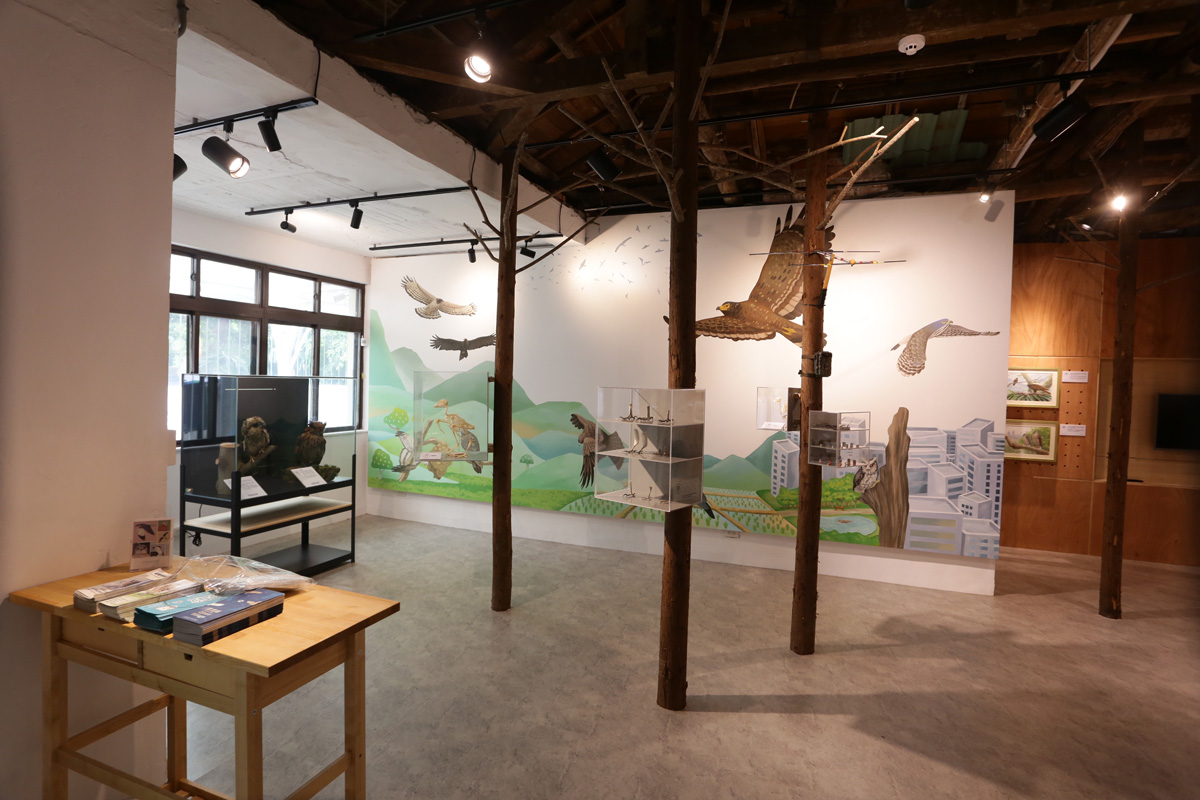The Raptor Research Group of Taiwan (RRGT) plans to revitalize the city’s vacant land through a private-proposal by Taipei City. The project was endorsed by the Taipei City Animal Protection Office, the city government team, and Councilwoman, Mrs. Shu-Pei, Chien to start the operation of Grass Mountain Raptor Center. Furthermore, the Wistron Foundation sponsored the building of an educational exhibition area and multifunctional classrooms while the 510 Dream raised funds for medical equipment such as an X-ray machine for Raptor medical use. All the efforts finally turned an old building on Yangmingshan into the Grass Mountain Raptor Center, which integrates three aspects, raptor research, rescue, and education to provide the public a new place to learn about raptors.
By showcasing the beauty and diversity of Taiwan's raptors, the center displays rare raptor specimens, large murals, and woodcarvings. Their first exhibition, "Raptor Research Group Retrospective - Searching for the Shadow in the Sky", focuses on the center’s research. The educational exhibition area is open to the public for free and a tour guide can be booked for groups of more than 10 people. A Raptor Training Camp is now available.

In any ecosystem, the presence of predators is required. In the food chain, predators are also known as tertiary consumers. Every ecological theory establishes that the presence of tertiary consumers contributes to the stability of the ecosystem and promotes the maintenance of species diversity. Throughout human history, raptors have usually been the subject of misunderstanding and harm. For example, in some Western cultures, raptors are usually killed because they are deemed as dangerous predators. Recently, while raptors have been able to shed their stigma as dangerous predators, the accumulation and presence of rodenticides and pesticides such as DDT in the food chain has caused a massive decline in the raptor population in some areas.
The ongoing agricultural development of Taiwan has resulted in a decrease in raptor numbers due to factors such as habitat destruction caused by an increasing population density, hunting, use of raptors in some cultural practices, and other damages caused by the accumulation of toxic substances. Fortunately, in the last decade, raptor populations in Taiwan seem to be slowly regaining their usual numbers. In particular, after the release of the RRGT documentary "Fly, Kite Fly," an emphasis on food safety and environmental drug safety led to a reduction in pesticides and rodenticides. Not only did the black kite population slowly recover, but also raptors and other tertiary consumers. Additionally, people are also more willing to eat food crops produced without pesticides.
Though the number of raptors is gradually picking up, the public is still unfamiliar with raptors. In the 1990s, a group of professional and amateur researchers, artists, photographers, directors, and people from other walks of life formed the RRGT. It was officially established in 2001 with the goal of conducting research, promoting the conservation of raptors, and educating the public on their environmental importance. In addition, the group also aimed to provide timely assistance to raptors in distress.

Address: No. 7, Jianye Rd, Shilin District, Taipei City, Taiwan Opening Hours: Tuesday – Saturday 11:00 – 17:00 Admission ticket: Free admission to the educational exhibition area Public transportation Information: Bus routes No. 260, 303, 681, Red 5, S15 to Qingtiangang, and the Royal Bus JinShan Line (Line 1717). On holidays, leisure buses No. 109 and 111. Located at just a 5-minute downhill walk from the Shanzihou Police Station.
A special thanks to RRGT for this article and photos.




 中
中